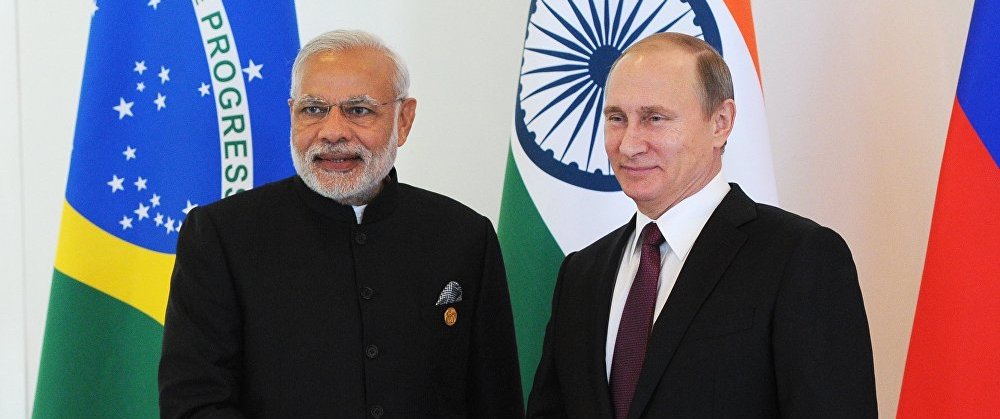Modi-Putin upcoming summit
May 18, 2018 | Expert Insights

Indian Prime Minister Narendra Modi is scheduled to meet Russian President Vladimir Putin in the Black Sea resort town of Sochi on May 21st. The two heads of state, who reportedly have a good personal relationship, last met in September 2017 on the sidelines of the BRICS summit in China’s Xiamen.
Background
Russia is considered an important ally for India. The two countries have shared strategic, military, economic, and diplomatic relations for years. The Indo-Russian intergovernmental commission is one of the largest comprehensive governmental mechanisms that India has had with any country internationally. However, the 1960s were testing times for the two, when Russia started getting closer to Pakistan. After the 1965 India-Pakistan war, Russia reduced its support to India on the Kashmir issue. However, ties normalized and became strong in its aftermath. India’s participation in the Non-Aligned Movement helped it maintain a position of neutrality during the Cold War, and maintain cordial relations with Russia.
Moscow has supported India’s application for the Nuclear Suppliers Group. In 2014, India abstained from voting in favor of Russia on the Ukraine issue to maintain its neutrality with Russia and the US. Last year, Russia pushed for New Delhi’s membership in the Shanghai Cooperation Organization. A recent report on global arms trade that analyzed the past five years noted that Russia still remains India’s top supplier of weapons. Russia has supplied 62% of India’s arms in the past five years. In 2016, India and Russia signed billions of dollars of defense and energy deals, and in 2017, trade grew by 22%.
In April 2018, India’s defense minister visited Moscow to finalize a weapons deal worth $6 billion. However, Russia is currently under a number of sanctions from the US (under Countering America’s Adversaries through Sanctions Act or CAATSA), and any country trading with Russia’s defense and intelligence sectors could also face sanctions. As part the deal, the Indian military wants to buy five S-400 long-range surface-to-air missile systems. While some analysts believe that America will not find the purchase sanctions-worthy, Indian Foreign Secretary Vijay Gokhale and Defense Secretary Sanjay Mitra have held high level meetings in Washington to address potential concerns. Read more on this here.
Analysis
“This will be an important occasion for the two leaders to exchange views on international matters in a broad and long-term perspective with the objective of further strengthening our Special and Privileged Strategic Partnership. Both leaders will also discuss their respective national developmental priorities and bilateral matters,” the Indian Ministry of External Affairs said in a statement. Official sources told PTI that the talks in Sochi on May 21st will last for 4-6 hours, and will be “agenda-less”.
Analysts believe that the two leaders will discuss a number of multilateral issues including the impact of US withdrawal from the Iran nuclear deal, the situation in Afghanistan and Syria, Russia’s partnerships with China and Pakistan, and upcoming Shanghai Cooperation Organization (SCO) and BRICS summits. Furthermore, it is possible that the two leaders will discuss the future of Russia and India’s defense agreement.
“The Prime Minister’s decision to make a standalone visit to Russia at this stage is a reflection of the country’s importance in the bilateral, regional and global context, Putin’s authority in Russia, India’s concerns about growing Russian engagement with and dependence on China, its exploration of new opportunities with and sensitivities towards Pakistan… and the uncertainties caused by the Trump administration’s unpredictable and unilateralist impulses,” noted former Indian Ambassador Arun K Singh.
Foreign Secretary Vijay Gokhale, National Security Advisor Ajit Doval, and Defense Minister Nirmala Sitharaman have all attended talks in Moscow since April. “We are not going to allow our defense requirements to be dictated by any other country. Whatever is in India’s interests in terms of procuring equipment for national security is what will determine how we act with various countries,” an official source told The Hindu ahead of the talks.
“Today in some ways, the US-Russia relationship is in some ways worse than the Cold War days where there are tensions over Ukraine, Syria to Afghanistan,” former Indian ambassador to Russia P.S. Raghavan said. “Given today’s geo-political situation, it is a very, very good idea to reaffirm the India-Russia strategic partnership and hold consultations on how to react to situations, find commonality in views.”
President Putin is hosting a series of dignitaries at Sochi this week. Putin has already met with Israeli Prime Minister Benjamin Netanyahu, Syrian President Bashar al-Assad, and German Chancellor Angela Merkel. Sochi hosted the Eurasian Economic Summit earlier this month as well. Meanwhile, Iran’s foreign minister Javad Zarif recently visited Moscow to meet his counterpart Sergei Lavrov, to reaffirm Russia’s support for the Iran nuclear deal.
Putin is scheduled to meet Xi Jinping at the Shanghai Cooperation Organization (SCO) in Qingdao this June, an event that will also be attended by Prime Minister Modi. Modi recently concluded a visit to Nepal, and met with Chinese President Xi Jinping for an informal summit in Wuhan in April. He also recently met German Chancellor Angela Merkel. The PM is also scheduled to meet Bangladesh Prime Minister Sheikh Hasina in Shantiniketan on May 25.
Assessment
Our assessment is that amidst shifting geopolitics in the Middle East and Asia, as well as the uncertainty of the Trump regime, India could be seeking to ensure that its time-tested relationships remain strong. As President Putin has just secured another six-year term, Modi’s visit is purposefully timed. We believe that India may want to reiterate trade and defense commitments, as well as ensure that it has a strategic partner in the region.








Comments